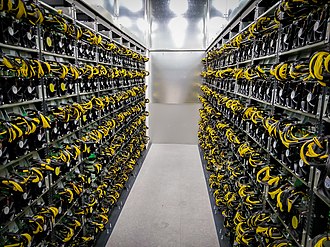
The environmental impact of bitcoin is significant. Bitcoin mining, the process by which bitcoins are created and transactions are finalized, is energy-consuming and results in carbon emissions, as about half of the electricity used is generated through fossil fuels.[1] Moreover, bitcoins are mined on specialized computer hardware with a short lifespan, resulting in electronic waste.[2] The amount of e-waste generated by bitcoin mining is comparable to that generated by the Netherlands.[2] Scholars argue that bitcoin mining could support renewable energy development by utilizing surplus electricity from wind and solar.[3] Bitcoin's environmental impact has attracted the attention of regulators, leading to incentives or restrictions in various jurisdictions.[4]
- ^ Huang, Jon; O'Neill, Claire; Tabuchi, Hiroko (3 September 2021). "Bitcoin Uses More Electricity Than Many Countries. How Is That Possible?". The New York Times. ISSN 0362-4331. Archived from the original on 17 February 2023. Retrieved 1 February 2022.
- ^ a b Cite error: The named reference
deVries2021was invoked but never defined (see the help page). - ^ Cite error: The named reference
You2023was invoked but never defined (see the help page). - ^ Cite error: The named reference
Stoll2023was invoked but never defined (see the help page).